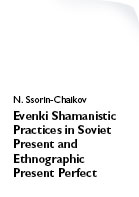→
Стеллажи
→
Этнография
→
Evenki Shamanistic Practices in Soviet Present and Ethnographic Present Perfect
Evenki Shamanistic Practices in Soviet Present and Ethnographic Present Perfect
In this article, I explore cultural effects of Soviet religious policies in aboriginal Siberia by looking at the transformation of ritual identities and practices in a group of Evenki hunters and herders between the 1920s and the 1990s. I focus on meanings of buhadyl ( «spirits») which Evenki associate with old things and dead people. I read meanings and ritual frameworks of dealing with the buhadyl as sites for re-imagining Evenki identities and categories of belonging in the context of Soviet society and Soviet ethnographic gaze. In this article, I use results of my own field research in Central Siberia, as well as newly available Soviet archival materials.

На английском языке
Evenki Shamanistic Practices in Soviet Present and Ethnographic Present Perfect. Anthropology of Consciousness 1, pp. 1-18. 18 pp
